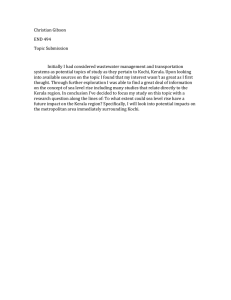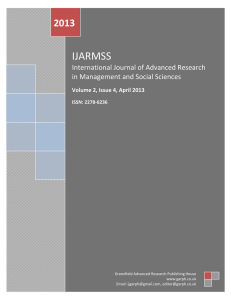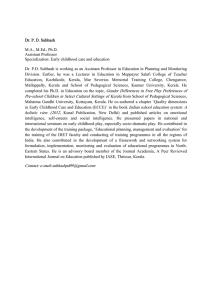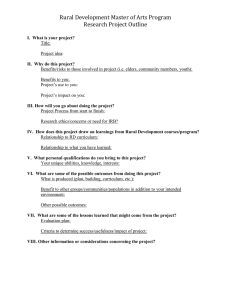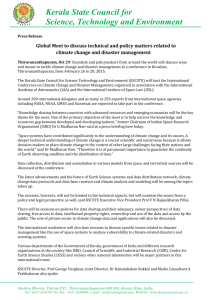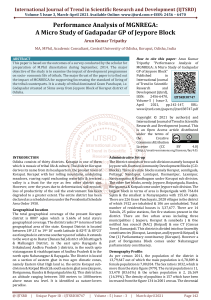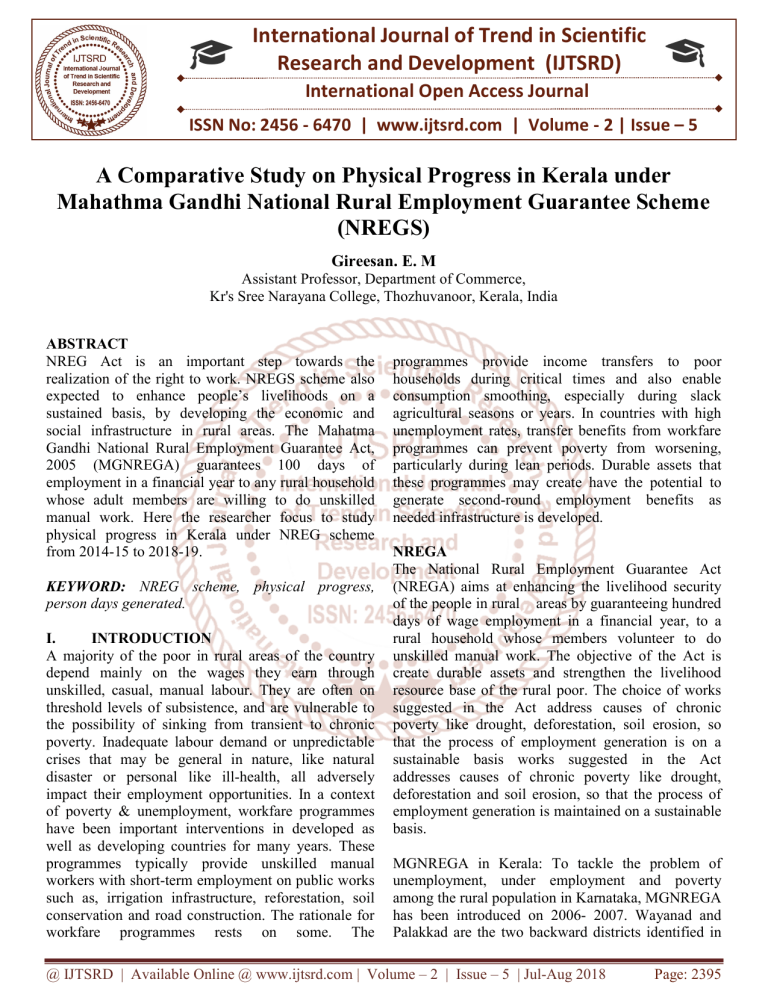
International Journal of Trend in Scientific
Research and Development (IJTSRD)
International Open Access Journal
ISSN No: 2456 - 6470 | www.ijtsrd.com | Volume - 2 | Issue – 5
A Comparative Study on Physical Progress in Kerala under
Mahathma Gandhi National Rural Employment Guarantee Scheme
(NREGS)
Gireesan. E. M
Assistant Professor, Department of Commerce,
Kr's Sree Narayana College, Thozhuvanoor, Kerala, India
ABSTRACT
NREG Act is an important step towards the
realization of the right to work. NREGS scheme also
expected to enhance people’s livelihoods on a
sustained basis, by developing the economic and
social infrastructure in rural areas. The Mahatma
Gandhi National Rural Employment Guarantee Act,
2005 (MGNREGA) guarantees 100 days of
employment in a financial year to any rural household
whose adult members are willing to do unskilled
manual work. Here the researcher focus to study
physical progress in Kerala under NREG scheme
from 2014-15 to 2018-19.
KEYWORD: NREG scheme, physical progress,
person days generated.
I.
INTRODUCTION
A majority of the poor in rural areas of the country
depend mainly on the wages they earn through
unskilled, casual, manual labour. They are often on
threshold levels of subsistence, and are vulnerable to
the possibility of sinking from transient to chronic
poverty. Inadequate labour demand or unpredictable
crises that may be general in nature, like natural
disaster or personal like ill-health, all adversely
impact their employment opportunities. In a context
of poverty & unemployment, workfare programmes
have been important interventions in developed as
well as developing countries for many years. These
programmes typically provide unskilled manual
workers with short-term employment on public works
such as, irrigation infrastructure, reforestation, soil
conservation and road construction. The rationale for
workfare programmes rests on some. The
programmes provide income transfers to poor
households during critical times and also enable
consumption smoothing, especially during slack
agricultural seasons or years. In countries with high
unemployment rates, transfer benefits from workfare
programmes can prevent poverty from worsening,
particularly during lean periods. Durable assets that
these programmes may create have the potential to
generate second-round employment benefits as
needed infrastructure is developed.
NREGA
The National Rural Employment Guarantee Act
(NREGA) aims at enhancing the livelihood security
of the people in rural areas by guaranteeing hundred
days of wage employment in a financial year, to a
rural household whose members volunteer to do
unskilled manual work. The objective of the Act is
create durable assets and strengthen the livelihood
resource base of the rural poor. The choice of works
suggested in the Act address causes of chronic
poverty like drought, deforestation, soil erosion, so
that the process of employment generation is on a
sustainable basis works suggested in the Act
addresses causes of chronic poverty like drought,
deforestation and soil erosion, so that the process of
employment generation is maintained on a sustainable
basis.
MGNREGA in Kerala: To tackle the problem of
unemployment, under employment and poverty
among the rural population in Karnataka, MGNREGA
has been introduced on 2006- 2007. Wayanad and
Palakkad are the two backward districts identified in
@ IJTSRD | Available Online @ www.ijtsrd.com | Volume – 2 | Issue – 5 | Jul-Aug 2018
Page: 2395
International Journal of Trend in Scientific Research and Development (IJTSRD) ISSN: 2456-6470
phase I. Then it universalized by covering all districts
In Kerala. Now MGNREGA focus to ensure
livelihood and food security to the rural poor through
creating sustainable assets.
II.
Statement of the problem.
Physical progress is the progress the project makes
with respect to time, resource or durations. The study
aims a comparative Analysis of .physical progress in
Kerala in the last two years under NREGA scheme .
2.1 Methodology: The study is based on secondary
source of data such as books, records, Government
documents, journals, magazines and official records
of Ministry of Rural Development and Panchayat Raj,
Government of Kerala and Government of India,
websites.
2.3 Tools for Analysis: statistical tools such as
comparative statement sand percentages are used to
derive valid conclusions from the study.
2.4 Objectives of the study.
The primary objective of the study to understand
physical progress in Kerala in the last few years
.Primary objective is fulfilled by attaining the
secondary objectives.
To know about Employment Provided to Disabled
Persons in Kerala in the last two years.
To make a Comparative analysis of Employment
Provided Period wise.
To understand Employment Patterns During the
last years.
To know about SC ST Employment Status in
Kerala.
2.2 Area of the Study: The study was undertaken in
Kerala:
3.1
TREND ANALYSIS OF PHYSICAL PROGRESS OF KERALA IN LAST 4 YEARS
DATA
TREND
FY
FY
FY
FY
2014201520162017II Physical Progress
201720162015- 20142015
2016
2017
2018
2018
2017
2016
2015
Approved Labour
450
603.11
713
761.4
100
93.6
79.2
59.1
Budget[In Lakhs]
Person days Generated
588.7
619.59 684.62 741.74
100
126.0
116.3
105.2
so far[In Lakhs]
2
% of Total LB
137.69 113.52 104.03 77.32
100
134.5
146.8
178.1
SC person days % as
16.25
17
17.4
17.48
100
99.5
97.3
93.0
of total person days
ST person days % as
4.56
4.47
3.93
3.88
100
101.3
115.2
117.5
of total person days
Women Person days
90.76
91.08
91.27 92.16
100
99.0
98.8
98.5
out of Total (%)
Average days of
employment provided
47.24
46.97
49.26 42.65
100
115.5
110.1
110.8
per Household
Average Wage rate per
214.2
260.91 243.09 231.82
100
108.2
113.4
121.8
day per person(Rs.)
8
Total No of HHs
1,17,37 1,13,18 1,65,98 98,64
completed 100 Days of
100
168.0
114.7
119.0
0
7
8
8
Wage Employment
Total Households
13.12
14.57
15.06
13.8
100
109.1
105.6
95.1
Worked[In Lakhs]
Total Individuals
14.71
16.44
16.93 15.13
100
111.9
108.7
97.2
Worked[In Lakhs]
Differently abled
1740
2005
1981
1753
100
113.0
114.0
88.5
persons worked
Source: www.mgnrega.nic.in
@ IJTSRD | Available Online @ www.ijtsrd.com | Volume – 2 | Issue – 5 | Jul-Aug 2018
Page: 2396
International Journal of Trend in Scientific Research and Development (IJTSRD) ISSN: 2456-6470
During the last financial year 2017-18, 47.24 lakh average days of employments have been provided to
households and 619.59.lakh person days of employment generated. The program has attracted down trodden
groups like Scheduled Caste (16.25%), Scheduled Tribes (4.56%) and women (90.76%) while comparing with
the base year (2014-2015) the statistics shows a decreasing trend on physical progress in Kerala.
3.2
Works completed during the period from 2006-07 to 2014Total No. of Works Taken up
Number of Ongoing
Year
(New + Spill Over)[In Lakhs]
Works[In Lakhs]
2018-19
2.08
1.87
2017-18
2.93
1.65
2016-2017
3.65
1
2015-2016
3.53
1.51
2014-2015
2.96
1.1
Total
15.15
7.13
Source: www.mgnrega.nic.in
Number of
Completed Works
21,327
1,27,474
2,64,299
2,01,276
1,86,056
8
Table-3.2 shows that out of the total 15lakhs works taken up, only 8lakhs works have been completed and
7.13lakhs works are still in progress from 2014-15 to 2018-19. The performance in terms of completed work is
quite low.
3.3
Employment provided to different categories
SC person days %
ST person days %
Women Person days
YEAR
as of total person days as of total person days
out of Total (%)
2018-19
16.77
6.33
90.14
2017-18
16.25
4.56
90.76
2016-2017
17
4.47
91.08
2015-2016
17.4
3.93
91.27
2014-2015
17.48
3.88
Source: www.mgnrega.nic.in
92.16
Table-3.3 shows the employment provided to different categories from 2014-15 to 2018-19 in Kerala. From the
table it is clear that there is a drastic increase in the involvement of ST workers in NREG scheme every year.
The study also reveals that majority of NREG workers are women.
3.4
person days generated
Person days
SC person
Generated
days %
YEAR
so far[In
as of total
Lakhs]
person days
2019-18
216.32
16.77
2018-17
20172016
20162015
20152014
ST person
days %
as of total
person days
6.33
Women
Person days
out of Total
(%)
90.14
Total No of HHs completed
100 Days of Wage
Employment
842
619.59
16.25
4.56
90.76
1,17,370
684.62
17
4.47
91.08
1,13,187
741.74
17.4
3.93
91.27
1,65,988
588.72
17.48
3.88
92.16
98,648
Source: www.mgnrega.nic.in
@ IJTSRD | Available Online @ www.ijtsrd.com | Volume – 2 | Issue – 5 | Jul-Aug 2018
Page: 2397
International Journal of Trend in Scientific Research and Development (IJTSRD) ISSN: 2456-6470
Table-3.4 shows the details of person days generated
from 2014-2015-2018-19. In total person days of
28.50 .crores, the share of SC category is 16.98%
ST category is 4.64%.. During the year 2015-16 total
person days generated was 741.74Lakhs and it has
decreased to 619.59Lakhsperson days in 2017-18.
During the year 2014-15total No of HHs completed
100 Days of Wage Employment was 98648 and it has
increased only to 1,17,370in 2017-18.
Summary
Since the inception of MGNREGA it has
generated28.5 crore person days from2014-2015
0nwards.The present average wage earned is
Rs.273.93/- per day as it wasRs.214.28/- per day in
2014-2015. It shows that the average wage has been
substantially increased in the state but it is not enough
to cope up with inflation and standard of living The
state has provided employment to 66.8lakhs rural
households
and
74lakhs
individuals
under
MGNREGA. Out of which the share of the
marginalized groups like of SC category is 16.98%
and ST category is 4.64%.
Conclusion
MGNREGA is the largest employment providing
program in India. It has provided work to
11.28coreruralworkers in India. It addressed 41% of
the problem of under employment in rural areas. From
2014-2015onwards 28.5days of employment has been
generated in Kerala .MGNREGA has helped in
improving the occupation in rustic regions by giving
100 days of ensured wage work in each budgetary
year to every household who volunteers to do
unskilled manual work. It likewise helped in the
making of sturdy resources that can give ecological
administrations and economical occupation; decrease
in trouble rustic movement and work cooperation by
women, SC, ST and crippled people. MGNREGA
helps in reinforcing of gross root process of
democracy
REFERENCES
1. Harsimran Singh (2012). Mahatma Gandhi
National Rural Employment Guarantee Act
(MGNREGA), IJRCEM.
2. Manjunatha S. (2013). The Role of Women Self
Help Groups in Rural Development of Karnataka State, Int. Res. J. Social Sci., 2(9), 23-25.
3. Prasanna V Salian and D S Leelavathi
(2014).Implementation of Mahatma Gandhi
National Rural Employment Guarantee Act in
Karnataka: Issues and Challenges, JRD, NIRD,
Hyderabad.
4. T. P. Shashikumar (2013). Origin and
performance of MGNREGA in India: A special
reference to Karnataka, Artha Prabhand, a Journal
of Economics and Management.
@ IJTSRD | Available Online @ www.ijtsrd.com | Volume – 2 | Issue – 5 | Jul-Aug 2018
Page: 2398

